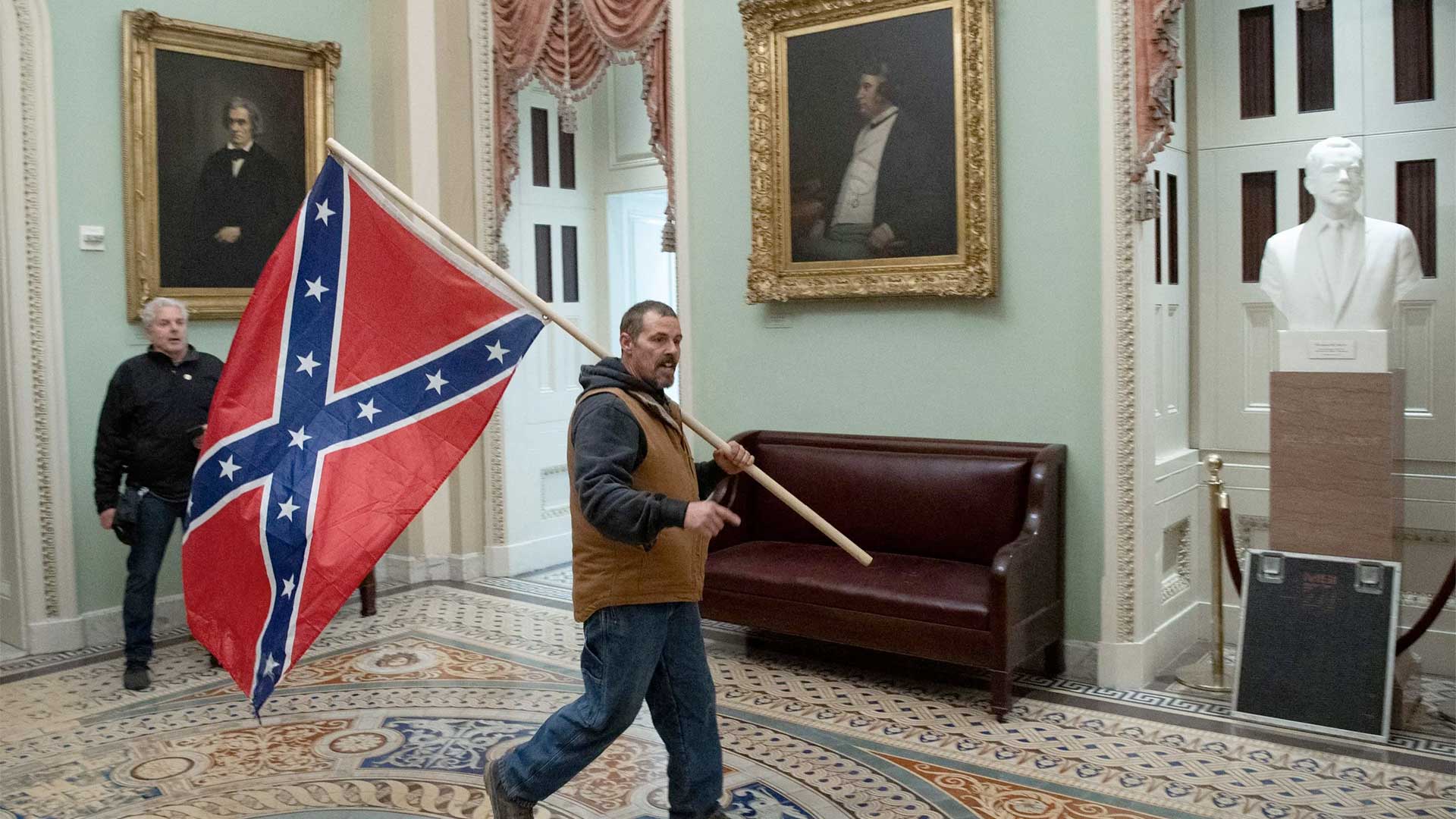Republished with permission from Steve Schmidt
Don’t look away from Trump.
Observe his baleful glare. It is rooted to a deeper malevolence of the human spirit that has existed since the beginning of time. It has coursed through every culture and society, where it encounters the worthy virtues and competes in an enduring struggle that has bended over the eons towards justice in the estimation of one of freedom’s greatest tribunes, the Rev. Martin Luther King.
King was born in Georgia in 1929. There is no question that the aging eyes of one of the tens of thousands of veterans of the Confederate Army would have fallen on the young Black boy growing up during the Great Depression in Jim Crow Georgia. When King took his first steps and spoke his first words emancipated slaves and former slave owners still lived in America. When King was six years old the Nazi regime in Germany decreed into law the Nuremberg Race Laws that stripped Jews of their citizenship, and established a criterion of racial identity for the purposes of discrimination, and ultimately obliteration, inspired by the miscegenation laws of the American south—which the Nazis viewed as too extreme.
King wondered about the injustice that abounded around him. In time, he came to understand the dissonance between the ideals of the country and the reality of Jim Crow.
Why was the world the way that it was in the time that King was born in 1929, 64 years after the end of the Civil War? Why was the world the way it was when King wrote this letter to a group of white pastors when he was 34 years old from a Birmingham jail cell? Why was it the way it was when he rose to speak in 1963 in the shadow of Lincoln’s temple, and why was it the way it was on the eve of Barack Obama’s inauguration?
Of course the reason in all instances was because of what had come before. Each day was a canvas of possibility and simultaneous unchangeability, until suddenly something gave way—even if it was barely noticed in the moment.
A great debate has erupted in America over our history. In fact, across America there are unconstitutional state laws being passed that seek to criminalize the teaching of history. There should be no confusion about the debate, its historic antecedents, its connection to yesterday and yesteryear, as well as the relative virtues of each side’s position. Suffice it to say that the cause of locking librarians and stifling reality in defiance of the truth, while proclaiming faith in a dogma of lies and revisionism, won’t be highly esteemed by future generations of freedom-loving Americans. Though it is clear how the issue will ultimately end there is no mystery around what happened last month, last year, last decade, last century, and so on. There is only a disorientation in the present that lingers around the issue that has always lingered in America, and defined who we are, what we were, and what we can hope to be.
It is no random coincidence that the extremist ideologists attempting to ban books and rewrite history wanted to start at a particular crossroads. Interestingly, at all of the inflection points in American history where revisionism could have been introduced the MAGA crusaders have picked slavery as their hill to die on. Why?
The assertion that American slaves learned skills and trades as being core to the understanding of the institution isn’t the same thing as Holocaust denial, but it is a related calumny in that it asserts nonsense in the service of an immoral cause and claim that is part of the timeless push and pull between the light and the dark.
The crude assertion that American slaves learned skills, trades and accreted benefits from their bondage is a typical non sequitur from an extremist movement that seeks to evade a moral teaching and history’s judgements. Again, why?
Maybe this speech helps explain why.
It’s known as the “cornerstone” speech, and it was given by Alexander H. Stephens, the vice president of the Confederacy. It makes perfectly clear over what the US Civil War was fought. It was fought over an idea that we are still fighting. It is an enduring cancer, and its embers have proved durable and combustible. The progress towards justice has been steady, but it is not inexorable and it has never been unopposed.
The opposition has changed and softened over time. The hard-edged language has given way to softer euphemisms. Lee Atwater explained it this way:
Trump is connected to George Wallace, who is connected to his predecessors all the way back to Jefferson Davis himself. Their lost cause has always been built around a single cause: white supremacy.
Alexander H. Stephens did history a favor with his “cornerstone” speech. He left an indelible record about what it was that killed between 600,000 – 850,000 Americans. Stephens made clear the stakes. Here is an excerpt:
But not to be tedious in enumerating the numerous changes for the better, allow me to allude to one other though last, not least. The new constitution has put at rest, forever, all the agitating questions relating to our peculiar institution African slavery as it exists amongst us the proper status of the negro in our form of civilization. This was the immediate cause of the late rupture and present revolution.
Jefferson in his forecast, had anticipated this, as the “rock upon which the old Union would split.” He was right. What was conjecture with him, is now a realized fact. But whether he fully comprehended the great truth upon which that rock stood and stands, may be doubted. The prevailing ideas entertained by him and most of the leading statesmen at the time of the formation of the old constitution, were that the enslavement of the African was in violation of the laws of nature; that it was wrong in principle, socially, morally, and politically. It was an evil they knew not well how to deal with, but the general opinion of the men of that day was that, somehow or other in the order of Providence, the institution would be evanescent and pass away.
This idea, though not incorporated in the constitution, was the prevailing idea at that time. The constitution, it is true, secured every essential guarantee to the institution while it should last, and hence no argument can be justly urged against the constitutional guarantees thus secured, because of the common sentiment of the day. Those ideas, however, were fundamentally wrong. They rested upon the assumption of the equality of races. This was an error. It was a sandy foundation, and the government built upon it fell when the “storm came and the wind blew.”
Our new government is founded upon exactly the opposite idea; its foundations are laid, its corner-stone rests, upon the great truth that the negro is not equal to the white man; that slavery subordination to the superior race is his natural and normal condition. This, our new government, is the first, in the history of the world, based upon this great physical, philosophical, and moral truth.
This truth has been slow in the process of its development, like all other truths in the various departments of science. It has been so even amongst us. Many who hear me, perhaps, can recollect well, that this truth was not generally admitted, even within their day. The errors of the past generation still clung to many as late as twenty years ago. Those at the North, who still cling to these errors, with a zeal above knowledge, we justly denominate fanatics.
All fanaticism springs from an aberration of the mind from a defect in reasoning. It is a species of insanity. One of the most striking characteristics of insanity, in many instances, is forming correct conclusions from fancied or erroneous premises; so with the anti-slavery fanatics. Their conclusions are right if their premises were. They assume that the negro is equal, and hence conclude that he is entitled to equal privileges and rights with the white man. If their premises were correct, their conclusions would be logical and just but their premise being wrong, their whole argument fails.
I recollect once of having heard a gentleman from one of the northern States, of great power and ability, announce in the House of Representatives, with imposing effect, that we of the South would be compelled, ultimately, to yield upon this subject of slavery, that it was as impossible to war successfully against a principle in politics, as it was in physics or mechanics. That the principle would ultimately prevail. That we, in maintaining slavery as it exists with us, were warring against a principle, a principle founded in nature, the principle of the equality of men.
The reply I made to him was, that upon his own grounds, we should, ultimately, succeed, and that he and his associates, in this crusade against our institutions, would ultimately fail. The truth announced, that it was as impossible to war successfully against a principle in politics as it was in physics and mechanics, I admitted; but told him that it was he, and those acting with him, who were warring against a principle. They were attempting to make things equal which the Creator had made unequal.
In the conflict thus far, success has been on our side, complete throughout the length and breadth of the Confederate States. It is upon this, as I have stated, our social fabric is firmly planted; and I cannot permit myself to doubt the ultimate success of a full recognition of this principle throughout the civilized and enlightened world.
As I have stated, the truth of this principle may be slow in development, as all truths are and ever have been, in the various branches of science. It was so with the principles announced by Galileo it was so with Adam Smith and his principles of political economy. It was so with Harvey, and his theory of the circulation of the blood. It is stated that not a single one of the medical profession, living at the time of the announcement of the truths made by him, admitted them. Now, they are universally acknowledged. May we not, therefore, look with confidence to the ultimate universal acknowledgment of the truths upon which our system rests?
It is the first government ever instituted upon the principles in strict conformity to nature, and the ordination of Providence, in furnishing the materials of human society. Many governments have been founded upon the principle of the subordination and serfdom of certain classes of the same race; such were and are in violation of the laws of nature. Our system commits no such violation of nature’s laws. With us, all of the white race, however high or low, rich or poor, are equal in the eye of the law. Not so with the negro. Subordination is his place. He, by nature, or by the curse against Canaan, is fitted for that condition which he occupies in our system.
The architect, in the construction of buildings, lays the foundation with the proper material-the granite; then comes the brick or the marble. The substratum of our society is made of the material fitted by nature for it, and by experience we know that it is best, not only for the superior, but for the inferior race, that it should be so. It is, indeed, in conformity with the ordinance of the Creator. It is not for us to inquire into the wisdom of His ordinances, or to question them. For His own purposes, He has made one race to differ from another, as He has made “one star to differ from another star in glory.”
The great objects of humanity are best attained when there is conformity to His laws and decrees, in the formation of governments as well as in all things else. Our confederacy is founded upon principles in strict conformity with these laws. This stone which was rejected by the first builders “is become the chief of the corner” the real “corner-stone” in our new edifice. I have been asked, what of the future? It has been apprehended by some that we would have arrayed against us the civilized world. I care not who or how many they may be against us, when we stand upon the eternal principles of truth, if we are true to ourselves and the principles for which we contend, we are obliged to, and must triumph.
Thousands of people who begin to understand these truths are not yet completely out of the shell; they do not see them in their length and breadth. We hear much of the civilization and Christianization of the barbarous tribes of Africa. In my judgment, those ends will never be attained, but by first teaching them the lesson taught to Adam, that “in the sweat of his brow he should eat his bread,” and teaching them to work, and feed, and clothe themselves.
When Martin Luther King looked out on hundreds of thousands on August 28, 1963, enough time had passed between 1861 that the cause of the Confederate flag had been sanitized. The Confederacy was resurrected in the imagination of the defeated south as a virtuous “lost cause,” romanticized and reimagined as a gallant struggle for states’ rights and “honor.”
Like flowing water smoothing a jagged edge, the flowery banalities eroded the true cause of the struggle, which was deeply rooted in the most important concept in human history: the notion that we are all created equally as human beings and endowed by a creator with inalienable rights that include life, liberty and the pursuit of happiness.
There is an alternative vision for America that was delivered by Abraham Lincoln in October of 1863 in Gettysburg:
Four score and seven years ago our fathers brought forth on this continent a new nation, conceived in liberty, and dedicated to the proposition that all men are created equal. “Now we are engaged in a great civil war, testing whether that nation, or any nation so conceived and so dedicated, can long endure. We are met on a great battlefield of that war. We have come to dedicate a portion of that field as a final resting place for those who here gave their lives that that nation might live.
It is altogether fitting and proper that we should do this. “But in a larger sense we cannot dedicate, we cannot consecrate, we cannot hallow this ground. The brave men, living and dead, who struggled here have consecrated it, far above our poor power to add or detract. The world will little note, nor long remember, what we say here, but it can never forget what they did here. It is for us the living, rather, to be dedicated here to the unfinished work which they who fought here have thus far so nobly advanced.
It is rather for us to be here dedicated to the great task remaining before us,that from these honored dead we take increased devotion to that cause for which they gave the last full measure of devotion, that we here highly resolve that these dead shall not have died in vain, that this nation, under God, shall have a new birth of freedom, and that government of the people, by the people, for the people, shall not perish from the earth.
This is our history. It is our story and we must learn it so that we can learn from it. Our story is essential for our progress and our survival.
The fight for justice will go on for as long as there is an America. Utopia is neither a place, nor a destination. It doesn’t, and will never exist. So long as there are human beings there will be struggle and it will endure. Yet that does not foreclose the possibility of progress towards justice. There can always be progress. There must always be progress because America is a project designed to be perfected over time.
It is important to know what time it is in America. Remember this. Our entire society is dependent on elections and the distribution of limited, temporary, lawful authority from them. Everything collapses without them and the debate about who gets to participate in them has long been stalled in America. The assaults on the election process in this country are an attack on America itself. They are an assault on the US Constitution.
When the insurrectionists needed a weapon they used this:
When they needed a banner they carried this:

A protester carries a Confederate flag during riots at the U.S. Capitol Jan. 6, 2021, in Washington, D.C. (Photo by SAUL LOEB / AFP)
It is all connected. It is all related.
What came before has brought us to this day. We should remember it so we can be reminded what it is that we are looking at. The issue at hand is not a disagreement. It is existential.
Ulysses S. Grant once faced a similar moment of clarity. It occurred shortly after Alexander H. Stephens gave his speech. He wrote to his father:
There are but two parties now: traitors and patriots. And I want hereafter to be ranked with the latter and, I trust, the stronger party.
Isn’t that the issue today as well?
I think it is.
Never forget what lies behind it. There is only one side in American politics that stands for human rights and American liberty. It has never been the side carrying the Confederate flag. It never will be.

Steve Schmidt
Steve Schmidt is a political analyst for MSNBC and NBC News. He served as a political strategist for George W. Bush and the John McCain presidential campaign. Schmidt is a founder of The Lincoln Project, a group founded to campaign against former President Trump. It became the most financially successful Super-PAC in American history, raising almost $100 million to campaign against Trump's failed 2020 re-election bid. He left the group in 2021.


